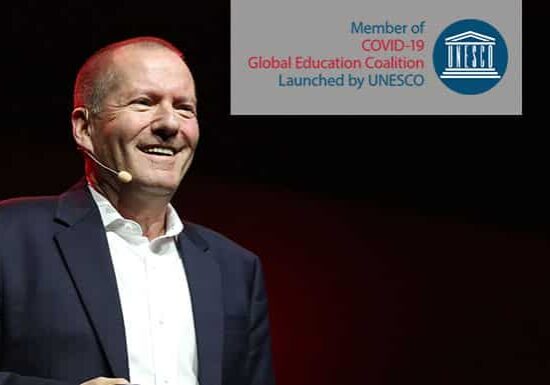How To Tackle Education During COVID-19 And Beyond: UoPeople President Shai Reshef Addresses The UN
Updated: October 24, 2024
Published: October 7, 2020

In a time when the COVID-19 pandemic is causing school closures and greatly disrupting learning, how can governments and educational institutions continue to support students’ and teachers’ needs? This was the main question addressed by an expert panel during a UNESCO event entitled Education During Covid-19 and Beyond: The Global Education Coalition in Action. The coalition was formed in response to the 1.6 billion learners who have been affected by the COVID-19 pandemic as schools have been mandated to shut their doors.
The University of the People’s own President Shai Reshef shared his perspective over the teleconference session. He was joined by Heads of States, ministers, teachers, intergovernmental organizations and private sector representatives offering insights and solutions to both short and long-term issues facing education during this time of crisis.
Leading the world’s first online, accredited and tuition-free university since 2009, President Reshef offered valuable insight: “When implemented correctly, online education is the solution to the crisis in higher education. Online education is not just putting lectures on zoom; rather, there is an entire pedagogy. You need to build in meaningful interaction for students, create virtual resources for students and train instructors in addressing the unique challenges that online students face.”
These sentiments have been transformed into action. On the ground solutions are being initiated between government and private sector collaborations, such as what’s taking place in Senegal. The Ministry of Education, Microsoft, Huawei and UNESCO’s coalition members have come together to support the Ministry’s Distance Learning Platform. 82,000 teachers and roughly half a million learners are enrolled and will benefit from Microsoft’s technology and Huawei’s hardware to stay connected and access education.
This is just one example of the many initiatives taking place around the world to continue to support education, especially from a distance. The threat against education is growing. Like President Reshef noted, drawing from UNESCO data, “There are around 7 million higher education students at risk of dropping out.” A major part of the solution will be to replicate successful online learning programs, such as what the University of the People offers. President Reshef continued to urge that “higher education must be affordable and accessible to survive.”
Along with President Reshef, other members shared their stories, ideas and solutions. For example, Antonia Bain, a teacher from Bahamas, urged the importance of preparing teachers for future crises. She explained how necessary it is to build resilience within the learning community. Additionally, a student from Mexico named Aurora Richaud discussed her own experience learning how to code from a distance, and the aid she’s gotten from mentors in different countries.
While the cost of education in traditional settings continues to rise, the traditional model of in-classroom education has been the most threatened at the hands of the pandemic. Schools have shut down and online learning has become the main mode for primary, secondary and higher education institutions globally.
But, in order to optimize its impact and feasibility, distance learning and higher education need to be accessible as well as affordable. From students’ experiences like Aurora’s and the thousands of graduates of UoPeople, it’s clear to see that distance learning can be the much needed solution, when designed and managed properly.
With UNESCO’s Global Education Coalition, more than 140 members will continue to find solutions to protect 4 million students and 12.7 million teacher beneficiaries in over 70 countries to make sure that #LearningNeverStops.
